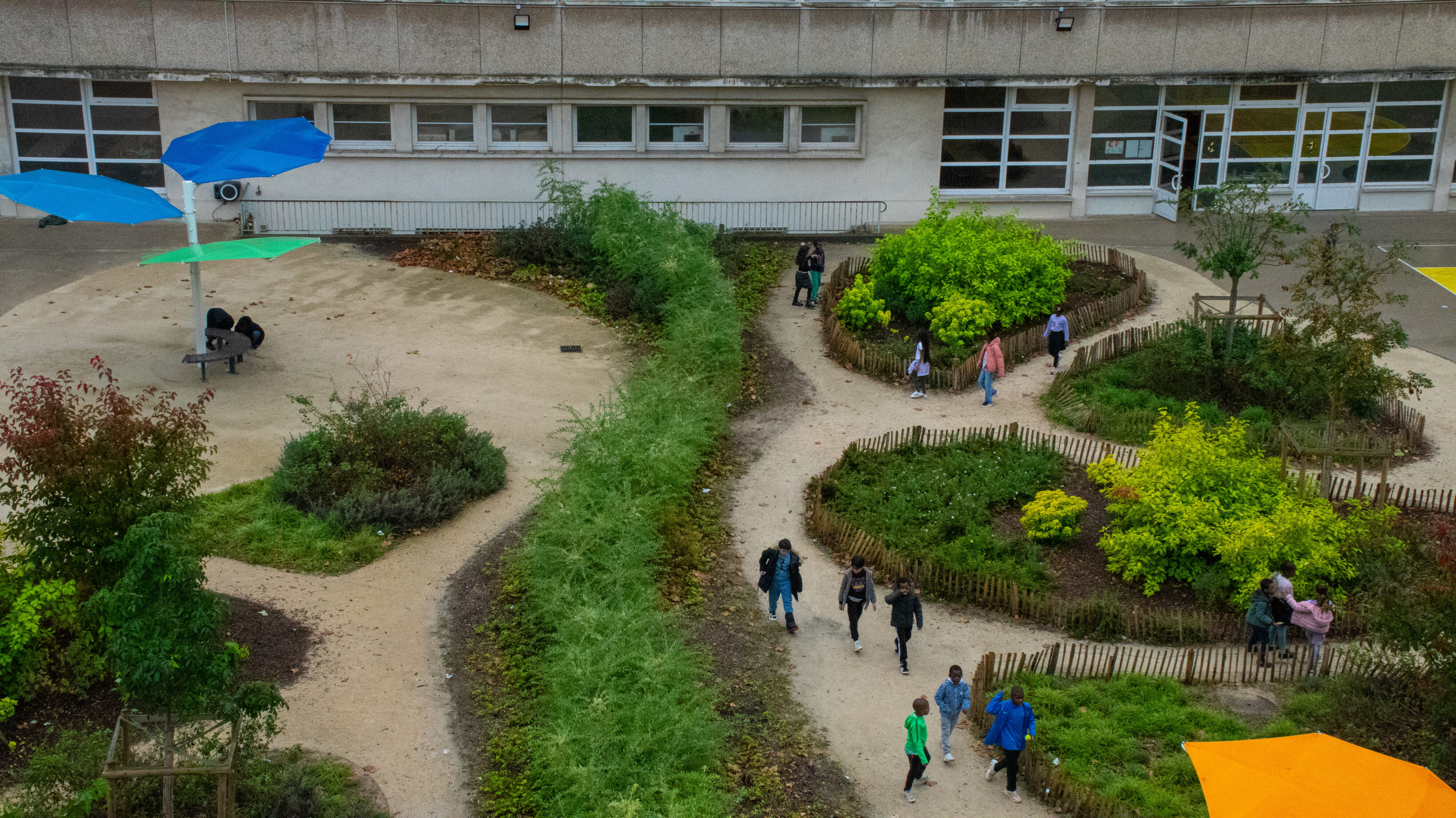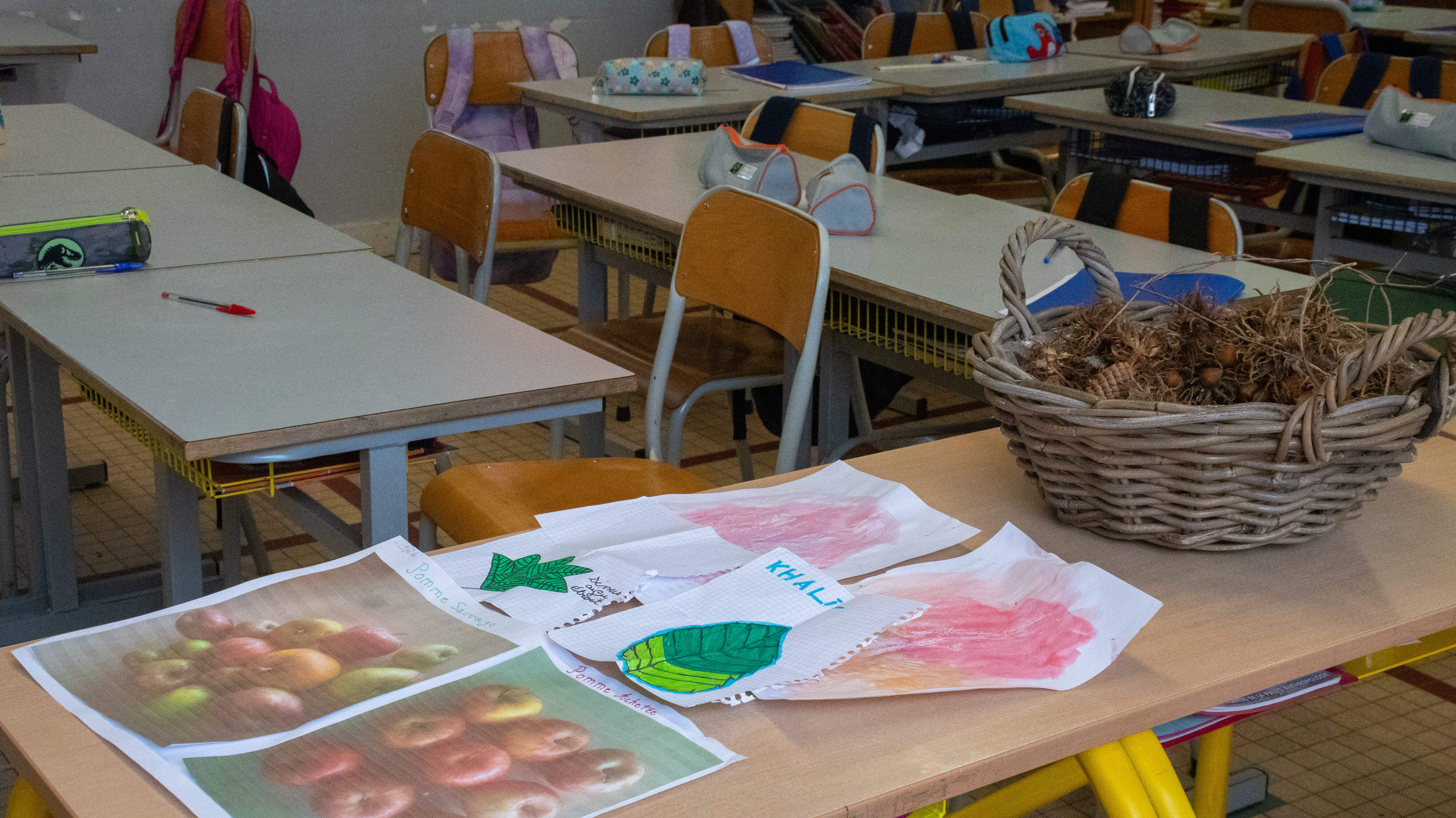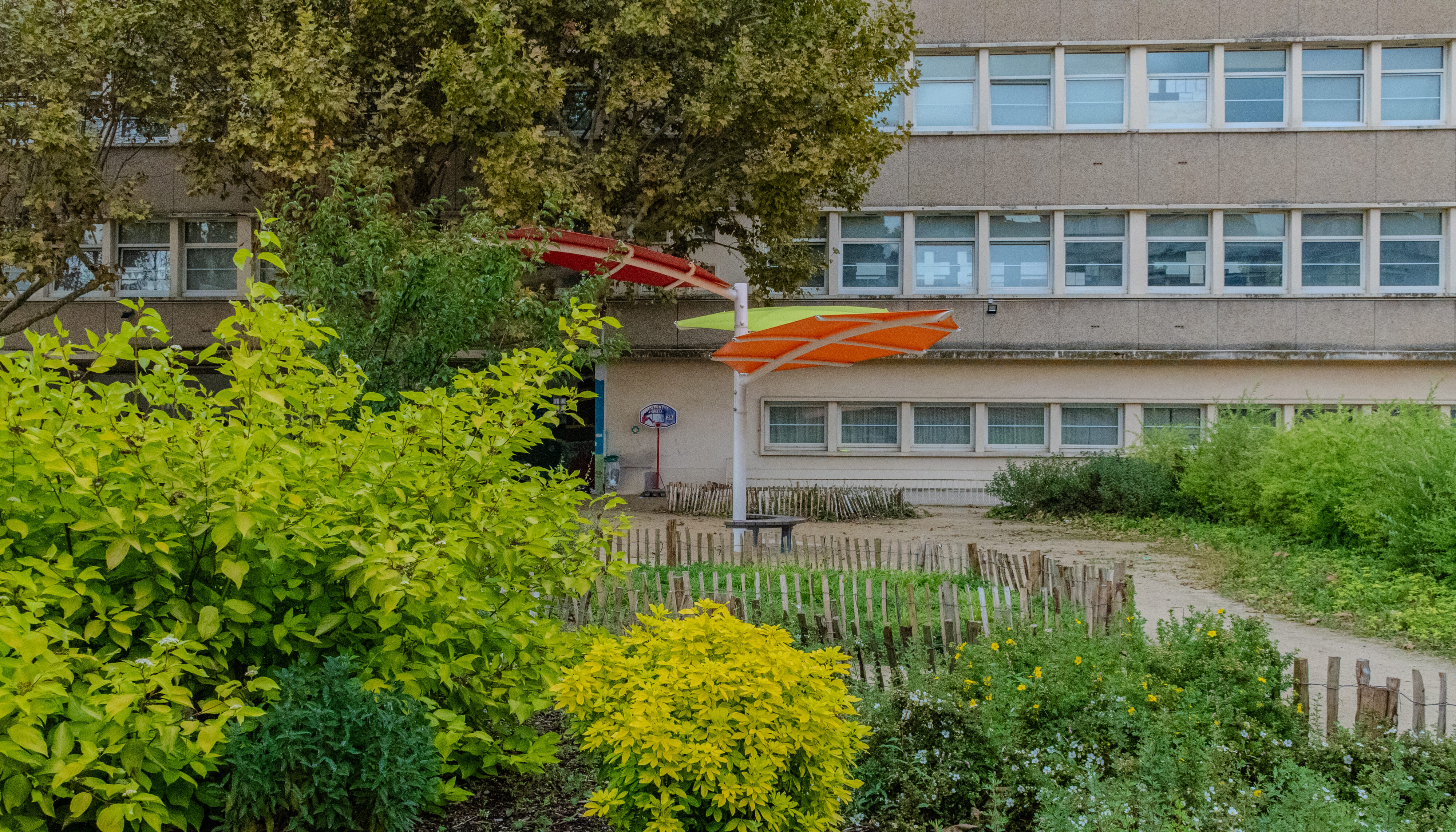
Juliette Fekkar

Juliette Fekkar
In Aubervilliers, a suburb just north of Paris, France, where green spaces are scarce and the streets bear the brunt of heat waves, schoolyards have become the latest frontier of adaptation.
The city, located in one of Europe’s most densely populated urban areas, is transforming its asphalt-covered schoolyards into fresh oases. This project, named Oasis, aims not only to cool down the overheated playgrounds, but also to provide much-needed greenery in a neighborhood where less than two square meters of public green space are available per resident — far below the World Health Organization’s recommended nine.
At the Joliot Curie Primary School, the transformation is striking. Gone is the heat-absorbing sea of asphalt that would often send playground temperatures soaring past 40°C, making it dangerous for children to play outside. In its place are bushes, newly planted trees, and strategically placed benches to enjoy the vital shade. A thick beige cover has replaced the concrete, reflecting heat and cooling the air in the process. According to Fabien Benoit, a city official overseeing the project, temperatures in the renovated courtyards have dropped by 2 to 4°C, also cooling the surrounding school buildings.

Teachers and the educational staff were invited to co-create the new schoolyards through brainstorming sessions and design proposals. “The point isn’t to copy-paste generic green playgrounds,” said Benoit. “Each school has different needs, and the school staff is best equipped to know what their needs are.” In true participatory fashion, one school included their fifth graders in the process — asking them to draw their ideal schoolyard, and pick between different possible infrastructures.
But compromises weren’t always easy. In the case of Joliot Curie, some teachers initially resisted the removal of popular football fields to make room for greenery, leading to two months of discussion between the school and the city.
To further build community support, the schools also open their doors to the public once a year, offering a glimpse into the transformation. On a recent visit, Gaelle Meynadier, whose five-year-old attends Joliot Curie, shared her relief that the once sweltering space now stays cooler.
“My kid often complained about being too hot at school, and there was nothing we could do about it. As a parent, that was truly worrying,” she said as she walked through the redesigned courtyard.

Despite the generally positive feedback, not all aspects of the plan have been embraced. “A few parents expressed frustration over muddy shoes and coats,” the school’s headmaster Sandra Chamak said. “But there have been much less accidents since the renovation, which brought parents on board.”
The renovations in Aubervilliers are part of a broader trend across France. Paris started to experiment back in 2014, followed more recently by other big cities like Bordeaux, Lyon, and Toulouse. In Aubervilliers, the project started in 2022 and has now revamped six schoolyards, removing nearly 3,000 square meters of asphalt.

And these new courtyards don’t just reduce heat. “They’re also a network of biodiversity havens that help bring back bees and butterflies that we don’t see anywhere else in the city,” Benoit said. For him, the newly planted vegetation will allow for miniature ecosystems to thrive in the otherwise stark urban landscape. Each school now includes educational gardens, where children can learn about gardening and have ‘class in the grass’.
“The kids love to learn more about nature,” said Roseline Ricco, a third-grade teacher, as she pointed to a basket of hazelnuts, freshly picked from the school’s garden, sitting proudly in the centre of her classroom. “The garden has sparked the children’s interest, leading to wider conversations about food, plants…” This week, her students compared the unevenly sized apples they picked from the garden with the uniform ones sold in supermarkets, and some even spent time sketching their favorite leaves.

The new schoolyards are also intended to be multifunctional. Aiming to “de-gender” the playground, the city has replaced single-use structures like football fields, often taken-over by boys, with more diverse sports markings, encouraging a wider range of activities.
But greening the schoolyards doesn’t come cheap. According to spending records obtained from the city, Aubervilliers has allocated €1.3 million to transform just two schools during the summer of 2024, and with it being one of the poorest cities in France, the local government has been careful to balance costs with its ambitions.
“We can only afford to do two schools a year,” said Zakia Bouzidi, the deputy mayor in charge of the environment. “It’s a slow process, but it’s great progress nonetheless.” Aubervilliers’ schoolyard transformations are entirely funded by the municipality, though they are still awaiting state aid.
However, the current plan is limited to preschools and primary schools, which fall under the city’s jurisdiction. The department and the region, which manage middle and high schools, are working on developing a comparable project, set to launch next year.

While these green oases were initially designed for schoolchildren, the city plans to extend their benefits to the wider public. Starting in 2025, some renovated schoolyards will be opened to the public during weekends and school holidays, offering residents of all ages a place to cool off during extreme heat. This initiative, which is still in its early experimental phase, could dramatically increase access to green spaces for thousands of residents in this low-income suburb, where many live in poorly insulated “kettle apartments” with no air conditioning.
But opening up schools isn’t an easy task. Concerns around security and the added costs of maintenance are still being discussed by city staff, while the local council’s opposition worries the initiative could lead to substantial wear and tear on playgrounds.
For Katia Boutakhednit, headmaster of the Jacques Prévert kindergarten, “this project makes a real difference in improving the children’s quality of life — but it also doesn’t magically solve everything.” Her schoolyard, in the process of being renovated, is trapped between high rise social housing buildings.

But the schoolyards “aren’t the only thing changing in Aubervilliers,” Bouzidi said. “They are just one part of the colossal work that is greening the city as a whole.” For now, the town’s focus remains on creating green spaces where they’re needed most. As France braces for more scorching summers, these playgrounds offer a glimpse of what urban adaptation to climate change can look like — one playground at a time.